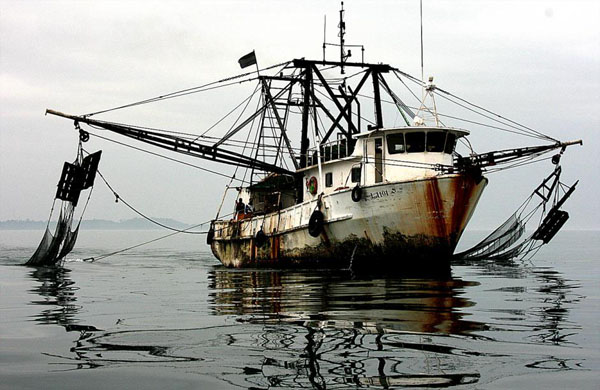(NOAA) A bill introduced in Congress yesterday would prevent pirate fishing vessels from entering U.S. ports to offload their illegally caught seafood. This pirate fishing is often called illegal, unreported and unregulated (IUU) fishing.
The Administration bill, which implements an international agreement the United States helped negotiate, would benefit U.S. fishermen, seafood buyers, and consumers by keeping illegal seafood out of global trade. It is sponsored by U.S. Sen. Daniel Inouye of Hawaii, who introduced it in the Senate yesterday, and is co-sponsored by Sens. Begich, Snowe, Whitehouse, Murkowski, and Rockefeller.
“Illegal fishing undermines fishermen in the U.S. and worldwide who fish sustainably and legally, and it can devastate fish stocks and ocean ecosystems,” said Jane Lubchenco, Ph.D., under secretary of commerce for oceans and atmosphere and NOAA administrator. “As one of the top importers of seafood globally, the U.S. is committed to combating illegal fishing and ensuring a level playing field for our fishermen. The international agreement and this bill will close the world’s ports to illegal fishing.”
Illegal fishing deprives law-abiding fishermen and coastal communities around the world of up to $23.5 billion in revenue every year, and undermines efforts to monitor and sustainably manage fisheries. Since seafood caught through IUU fishing enters the global marketplace through wide-ranging ports mostly outside the U.S., keeping that seafood from entering the global market requires an international solution and the cooperation of multiple countries.
“The sustainability of fish and fish products and the economic integrity of those who sell them is a priority for the seafood community,” said John Connelly, president of the National Fisheries Institute, an industry association. “Efforts to stamp out illegal, unreported and unregulated fishing go a long way in protecting the resource and ensuring the global seafood industry is operating at the highest standards. It also helps create a level playing field whereby the industry both in the U.S. and around the world plays by the same rules.”
“This legislation further strengthens the United States’ commitment to closing our ports to illegally caught fish,” said Gerry Leape, senior officer at the Pew Environment Group. “The U.S. is the third largest seafood market in the world, so passage of this bill will deal a heavy blow to any vessels looking to offload and sell contraband fish.”
This legislation arises from the first binding global agreement to focus on combating IUU fishing, the agreement on Port State Measures to Prevent, Deter and Eliminate Illegal, Unreported and Unregulated Fishing. This international accord is recognized globally as a landmark agreement. As a leader in the negotiation of the agreement, the U.S. was one of the first countries to sign it, an act that expresses an intention to ratify the agreement. The agreement will take full effect when 25 parties to the agreement ratify it. Three countries – Norway, Sri Lanka, and Burma – along with the European Union have already ratified it, and 18 more countries and the U.S. have expressed an intention to ratify.
Countries that ratify the agreement have four basic obligations:
- Designating ports through which foreign fishing vessels may enter;
- Conducting dockside vessel inspections in the designated ports, following established standards;
- Blocking port entry and access to port services to vessels known to or believed to have been involved in IUU fishing, particularly those on the IUU vessel list of a regional fishery management organization; and
- Sharing information, including inspection results, with the governments of vessels found involved in IUU fishing during an inspection.
U.S. law already prohibits foreign-flagged fishing vessels, even those operating legally, from landing their catch at most U.S. ports. However, in addition to fishing vessels, the agreement and implementing legislation extends to both transport and other support vessels, which may be carrying IUU fish transferred to them at sea.
The implementing legislation, introduced as the Pirate Fishing Elimination Act, follows the November 14 transmission of the agreement itself from President Obama to the Senate. Congressional approval of the agreement and its implementing legislation will ensure continued U.S. leadership in the global battle to stop IUU fishing and will allow the United States to encourage broad ratification of the agreement worldwide.
NOAA has taken a number of steps to combat IUU fishing and prevent illegal seafood from entering the global marketplace. In September, NOAA and the EU signed a historic statement pledging bilateral cooperation to combat pirate fishing. The U.S. also identifies countries engaged in IUU fishing through the U.S. High Seas Driftnet Fishing Moratorium Protect Act and participates in international fishery management organizations to address IUU fishing. To find out more about NOAA’s efforts to end illegal fishing, see http://www.nmfs.noaa.gov/stories/iuu/.
NOAA’s mission is to understand and predict changes in the Earth’s environment, from the depths of the ocean to the surface of the sun, and to conserve and manage our coastal and marine resources. Join us on Facebook, Twitter and our other social media channels.

 Join The Club
Join The Club











